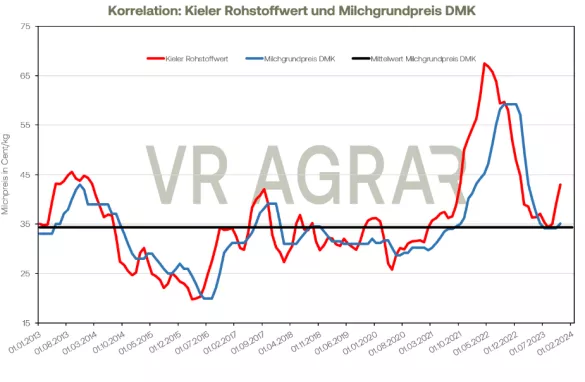Compared to the previous week, the amount of milk has decreased. According to preliminary calculations, around 0.4 percent less raw milk was served in the 48th calendar week. This is still below the comparable week of the previous year, but overall the dairies had around 1.5 percent more raw materials available to them this year. Demand on the raw material markets overall has calmed down, as is usual for the season. Concentrate prices are trending lower. Demand has also calmed down significantly on the spot market. The spot market price fell by 5.2 cents compared to the previous week to 38.4 cents/kg. The demand and orders for molded butter continue to develop favorably at a high level. The high volume of goods issued sometimes poses challenges for logistics. In order to fully meet demand, block butter is sometimes repackaged. The price quotations remain stable due to the contract. At the turn of the year, demand for molded butter is expected to calm down but remain high. The block butter market is also showing revitalizing tendencies. The number of requests has increased noticeably. Overall, however, new business remains subdued. Both manufacturers and buyers are taking a wait-and-see approach.The prices in Kempten were raised slightly yesterday. On the EEX, however, butter prices were under pressure and fell overall. Until March, the contract prices on the futures exchange in Leipzig were even below the current spot market level. Call-offs for cheese continue to be at an above-average level. The food retail sector in particular continues to order very briskly, but there are also additional orders and inquiries from the industrial and large consumer sales channels. Short-term additional requests usually cannot be addressed. The listing commission in Hanover was able to quote a higher price range due to the good demand. Inventories remain below average due to the high level of goods issued. Dairies are increasing their production volumes wherever possible, but can hardly keep up with the very good demand. Accordingly, price expectations remain firm. Even in mid-December, demand for skimmed milk powder was manageable. Industrial customers have largely stocked up on fresh goods by the turn of the year and additional requirements are hardly reported.The needs also appear to be largely covered for the first quarter of 2024. Export demand has also continued to calm down. Discussions about contracts for the second quarter of next year are increasingly taking place, but there are only a few new contracts. For whole milk powder , activities continue to be limited to servicing existing contracts; new inquiries are currently rare. Due to the significant lack of international competitiveness, demand from third countries is almost non-existent. Nevertheless, the price for whole milk powder rose by 30 euros yesterday at the lower end of the trading range and is now at 3,730 to 3,850 euros/t. A quiet business development has also been noted for whey powder . There is occasional interest in purchasing both for short-term deliveries and for later dates. Prices have increased by an average of 10 euros per ton compared to the previous week to 890 - 960 euros/t.

ZMP Live Expert Opinion
The Christmas business is nearing its peak. For November, many dairies have raised their payout prices, some significantly. However, the mood has deteriorated somewhat due to the subdued demand for powder and block butter.


